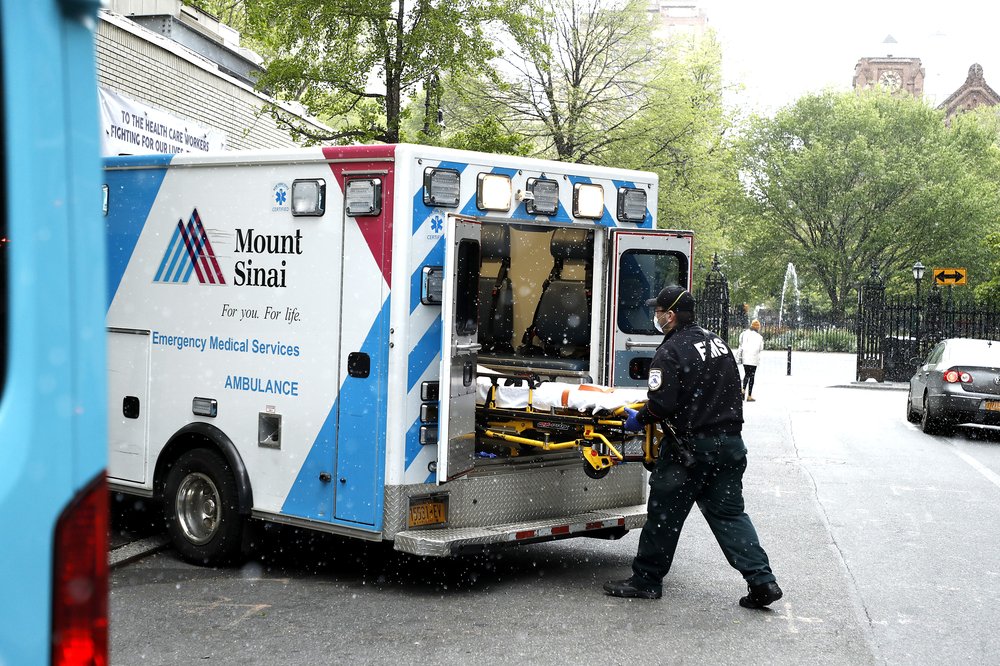Beth Israel in Manhattan ending stroke and cardiac services as closure plan looms
March 5, 2024, 4:29 p.m.
The FDNY received word of requested patient diversions for those conditions on Tuesday.

Mount Sinai Beth Israel is shutting down services for stroke and cardiac patients this month as a growing number of employees leave its staff, the hospital has confirmed.
The move comes as Mount Sinai aims to close down Beth Israel in Lower Manhattan this year, but has been ordered both by the state health department and state Supreme Court not to shutter any services without their approval.
Ambulances will stop taking all stroke and cardiac patients to Beth Israel on March 10 as part of a “permanent diversion” plan, according to an internal FDNY memo sent out Tuesday and obtained by Gothamist.
The hospital requested the patient diversions because it is allowing its stroke certification and its designation as a STEMI Center to expire, according to Loren Riegelhaupt, a spokesperson for Mount Sinai. The acronym STEMI refers to a kind of severe heart attack.
“Due to the lack of staffing and increasing patient safety concerns, these designations will not be renewed,” Riegelhaupt told Gothamist in response to a query about the FDNY memo.
He added that if any cardiac or stroke patients show up at Beth Israel’s emergency room, they will be treated, stabilized and transferred to other hospitals.
Mount Sinai first announced plans to close Beth Israel this past fall, setting a target date for July 2024. Hospital officials issued a memo in November saying they would reduce services in the months leading up to that date. But Mount Sinai has yet to get state approval for the plan, which prompted the orders from the state health department and court.
Mount Sinai and the health department both declined comment Tuesday on whether the hospital needed approvals to lets its stroke and cardiac designations expire. But in court document filed Tuesday, an attorney for Beth Israel said the hospital had consulted with the health department, which had said that the expiration of the stroke and STEMI designations did not constitute a closure of beds or services. The attorney, Claudia Hammerman, added that she did not believe that losing those designations violated the court’s order.
Riegelhaupt said “there have been a large number of voluntary staff departures” since the hospital’s closure plan was first announced.
“These departures have increased in recent weeks, including critical positions which we simply cannot replace, which is creating significant staffing challenges,” he said.
Patients who experience a large vessel occlusion stroke, where a major artery to the brain is blocked, were previously placed on permanent diversion from Beth Israel at the end of December, the New York Post reported at the time. An FDNY memo about that diversion was also shared with Gothamist, and a hospital spokesperson has acknowledged those diversions.
The FDNY sent out a separate internal notice in January saying Beth Israel’s five dedicated ambulances would no longer serve the hospital starting in February.
The fire department could still use other ambulances to transport patients to the hospital, according to Anthony Almojera, a lieutenant with FDNY's Emergency Medical Services division.
A TikTok user who routinely shares radio clips of EMS workers posted audio last month of EMS workers signing off as Beth Israel’s dedicated ambulances were taken off duty. “Signing off for the final time as part of the Mount Sinai Beth Israel era,” one person is heard saying on the recording.
Riegelhaupt declined to comment on the end of the dedicated ambulance service last month, citing the ongoing litigation.
Almojera said the diversions from Beth Israel could place greater strain on nearby medical centers. “Now these [ambulance] crews have to go further, and it just overloads the other hospitals, like Bellevue,” he said. “Bellevue's the catch-all.”
Bellevue Hospital is about nine blocks north of Beth Israel.
Mount Sinai submitted its closure plan to the state health department in late October, saying the hospital had to shut down because it was losing money and its patient census was declining. But critics of the plan have accused Mount Sinai of trying to force a closure by prematurely reducing services.
The state health department issued a cease-and-desist letter on Dec. 21 ordering Beth Israel to stop closing beds and services. Officials threatened to issue penalties of $2,000 for every day beds or services were closed without approval.
A group called the Community Coalition to Save Beth Israel Hospital and the New York Eye and Ear Infirmary sued Mount Sinai and the state health department to prevent the closure last month. A Manhattan judge issued a temporary restraining order on Feb. 9 directing Mount Sinai not to close beds or services without approval from the court and health officials.
Multiple Beth Israel employees have provided Gothamist with notices they recently received directing them to attend job fairs where they would choose assignments at other Mount Sinai facilities. But at least one employee received a notice, dated Feb. 20, that said any transfer would likely be postponed.
Gothamist reached out to Mount Sinai with a detailed list of questions about service reductions and employee transfers on Feb. 21. Riegelhaupt responded with a statement saying the hospital could not comment on pending litigation.
The union 1199SEIU, which represents employees at Beth Israel, also declined to share information on the job fairs or transfers.
In his statement last month, Riegelhaupt said hospital officials will “continue to work diligently with our regulators and local leaders to ensure all patients receive the care they need at the appropriate facility, whether that be at Mount Sinai or an alternate care center.”
This story has been updated to reflect a court filing by Beth Israel saying it consulted with state health officials before letting its stroke certification and STEMI designation expire.
State orders Mount Sinai to stop closing down Beth Israel hospital in Manhattan